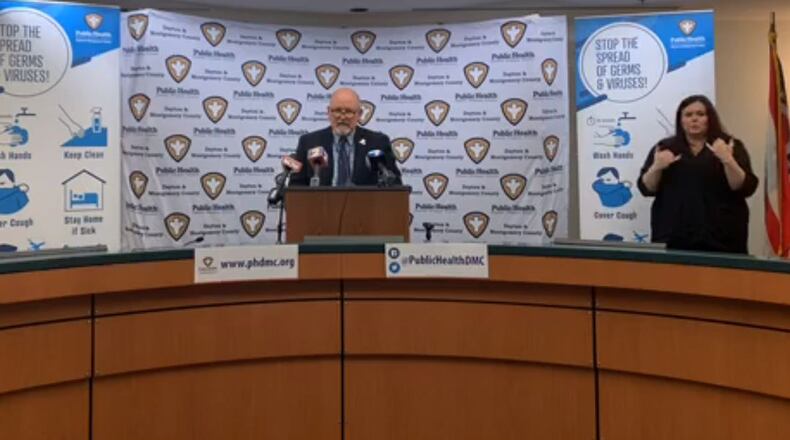“As that happens, it doesn’t necessarily mean things are getting that much worse. It just that we’re getting a better count of who is actually sick,” said Dr. Michael Dohn, medical director with Public Health-Dayton & Montgomery County.
Montgomery County Commissioner Judy Dodge said the local emergency management agency and St. Vincent de Paul have worked together and shipped over 150,000 pieces of personal protective equipment to front line workers.
“These supplies include N95 respirators, surgical masks, gowns, gloves and thermometers from the strategic national stockpile,” Dodge said.
The latest update on test-confirmed cases from the state shows about 55,900 Ohioans have been tested and about 5,512 cases have been confirmed since the start of the outbreak, with 213 confirmed deaths.
Montgomery County has recorded 156 cases, 50 hospitalizations and four deaths.
Warren County reported 53 confirmed COVID-19 cases on Thursday, seven more than the day before. According to the Ohio Department of Health, the number of hospitalized cases increased from seven to nine. Still no deaths have been reported in Warren County.
In Greene County, cases were up one confirmed case to 21 in Greene County, with seven hospitalizations and one death.
Miami County as of Thursday was up to 110 positive cases, 42 hospitalizations and 14 deaths.
Darke County General Health District reported 40 confirmed cases and seven deaths. Preble County has nine confirmed cases, four hospitalizations and one death.
The outbreak has prompted a rise in interested volunteers. The Dayton-area chapters of United Way, Declare and many other organizations are working together to ensure that mission-critical activities have volunteers. People with medical backgrounds looking to locally volunteer can learn more at declare.org/givemedicalhelp or call 937-476-7521 with questions.
Mayor Nan Whaley said she wanted to thank people for their hard work to flatten the curve and urged them to not let up. Whaley said the efforts can an enormous inconvenience. It can be painful, or even dangerous, she said, noting increased overdose rates recently and that some people are not getting the same health care they need.
“While this is painful, while this is tedious, while it is so difficult to home-school your children, I want to say thank you. I want to also say we are doing so well, we cannot let up,” she said.
Local residents who have recovered from COVID-19 now have a unique opportunity to contribute to efforts to defeat the virus through the Community Blood Center’s new COVID-19 Convalescent Plasma Program, which launches on Friday.
Through this initiative, COVID-19 survivors who have documentation that they tested positive for COVID-19 and are now symptom-free for at least 14 days may be able to donate plasma.
The FDA recently authorized the emergency use of convalescent plasma by physicians for current patients with serious or immediately life-threatening COVID-19 infections, or those deemed to be at high risk. More research is needed in determining the effectiveness of the plasma donations, but some evidence suggests that it can help recipients develop their own antibodies.
Dr. Roberto Colon, system vice president of quality and safety at Premier Health, said they encourage providers in the ICU, hospitalists, and primary care providers with patients recovering from COVID-19 to make their patients aware of this opportunity.
“By donating convalescent plasma, a donor will be potentially able to save the lives of several COVID-19 patients. Because there is not an established effective treatment, this therapy will be of particular benefit to those who have more severe disease manifestations,” Colon said.
Premier Health said the health system and CompuNet are doing the pre-screening services for this program, with Premier foundations covering the cost, to help build a large registry of potential donors. People can go to premierhealth.com/covid19plasma to learn more about financially donating or plasma donation criteria.
About the Author
